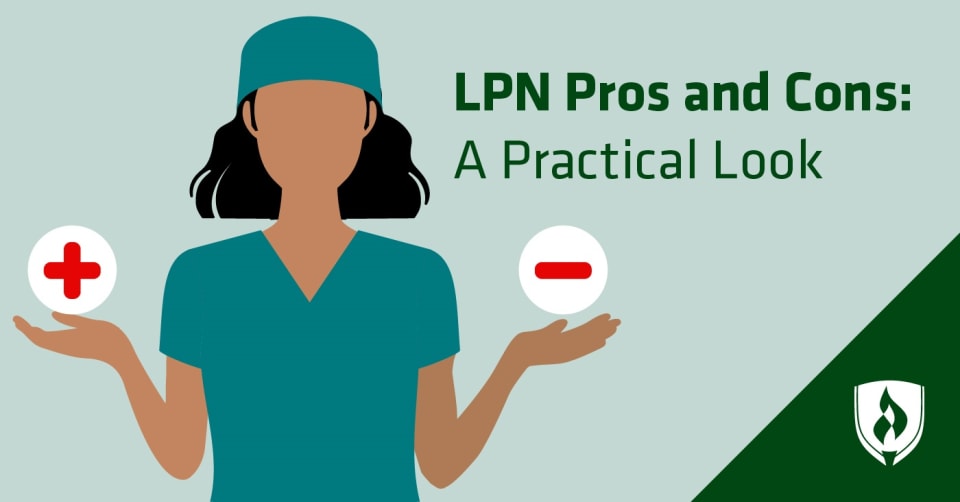
You used to think being a nurse was a straightforward career goal—but then you started researching career options and discovered it was more complicated than you originally thought. There are many different paths and levels of education that can lead you to a nursing career.
You’ve heard of registered nurses (RNs), but there’s another nursing role you should know about: LPN, or licensed practical nurse. Why become an LPN? There are plenty of good reasons to consider this option. But like with any career path, there are potential trade-offs to be aware of too.
Don’t take any chances with your future nursing career! We’re walking through the LPN pros and cons you need to know about so you can make the best decision for your unique situation. With this information in hand, you’ll be better prepared to make a confident decision.
Get Your Nursing School Questions Answered at a Nursing Information Session
The advantages of becoming an LPN
There are many advantages to choosing an LPN Diploma over other nursing education options. Here are the positive factors that might sway your decision.
1. You can start your nursing career faster
The most obvious advantage to an LPN track is that the time to completion can be significantly faster than other options. The Practical Nursing program at Rasmussen College allows students to complete their courses in as few as 12 months.1 Compared to the minimum 18 months it takes to achieve an Associate’s Degree in Nursing (ADN) or the three-plus years it can take to earn a Bachelor of Science in Nursing (BSN), it’s easy to see why an LPN Diploma is an appealing choice.1
If you’re looking to quickly get yourself on more stable footing in your career, the comparatively short runway to becoming an LPN may be especially appealing.
2. The job growth outlook for LPNs remains strong
LPNs can earn a decent salary, but what if there are no jobs available for you after you earn your Diploma and license to practice? Thankfully, demand for LPNs appears to be on solid ground, with the BLS projecting employment of LPNs to grow by 9 percent between 2019 and 2029.2
This job growth is considered much faster than the national average, with an addition of 65,700 new jobs projected in that timeframe by the BLS.2 Much of this growth projection is attributed to the aging Baby Boomer generation, which will continue needing increased medical care in the coming years.
3. There are fewer barriers to entry
Becoming a nurse can seem like an intimidating feat—and before you can even begin, you need to get into nursing school. What if your high school GPA isn’t where you’d like it to be, or you’re not sure about your TEAS (Test of Essential Academic Skills) results? Not to mention any prerequisite classes you may need under your belt.
Getting into nursing school is less of a hurdle for those pursuing the LPN career track. If you’re not feeling as confident about your academic abilities, this option can make a nursing career attainable—especially with the help of dedicated instructors and staff who want to see you succeed.
4. You can still advance to RN down the road
Are you worried about starting your LPN career then later wishing you could become a registered nurse? No problem! Many nurses begin their careers as an LPN to gain experience in the field and earn a steady income. You can always advance to a higher nursing degree to become an RN later down the road once you’re more established.
At Rasmussen College, LPNs have the opportunity to enroll in the Professional Nursing program via an LPN to RN Bridge offering. This allows you to build on your existing knowledge, further your education and be ready to take the NCLEX-RN exam in as few as 18 months.1
The drawbacks of becoming an LPN
While there’s clearly a lot to like about an LPN career, there are still some trade-offs you’ll want to consider before pursuing an LPN Diploma. We’ve highlighted some of the most prominent potential drawbacks to choosing this nursing career path.
1. There aren’t as many options for specialization
Registered nurses can choose from many specialty areas, like intensive care nursing, operating room nurses or public health nurses. These specialties may come with perks like a higher salary or more desirable work hours, or they may simply fall into alignment with a nurse’s interests.
However, those with their LPN designation are a bit more limited in their options. Many specialty areas require their nurses to have an Associate’s or Bachelor’s degree. LPNs can still choose to focus on specializations like long-term care or wound care—especially if they pursue relevant certifications—but they won’t have access to the same range of options as RNs.
Gerontology, or the care of elderly and aging populations, is the most popular work environment for LPNs. A whopping 38 percent of LPNs work in nursing homes or residential care facilities, while only 15 percent work in hospitals and 13 percent work in physicians’ offices.2
There’s certainly nothing wrong with working in the gerontology field! LPNs are an important part of elder care. However, if you’d rather not work exclusively with older patients, it may feel like your career options as an LPN are more limited than you expected when you first envisioned a nursing career.
2. LPNs have a smaller scope of practice
Scope of practice defines what duties a healthcare professional is qualified to perform. An LPN’s scope of practice varies by state, but they typically perform basic patient care under the supervision of an RN or other medical professional. LPNs can expect to take and monitor patient vital signs, maintain accurate health records, help patients bathe or dress and administer medications.
These are all vital duties that keep patients comfortable and maintain a high standard of care. But if you imagined yourself rushing through an ER to administer emergency care or consulting with a physician about a patient’s care plan, you might be disappointed in the LPN role.
A nursing career worth considering
Now that you know more about the potential pros and cons of becoming an LPN, have the advantages of being an LPN won you over? If you’ve decided this is the nursing career path for you, there’s no time like now to get started!
Your first step is choosing the right program. Take a look at the Practical Nursing Diploma page to learn more. If you’re feeling ready to learn more about the process of getting started in nursing school, sign up for a Nursing Information Session.
Related Articles:
- 4 False Assumptions About an LPN Career
- What Is an “LPN Degree?” A Closer Look at the Training
- LPN vs. CNA: Comparing Potential First Steps into the Nursing Field
- What Is a Practical Nurse? Understanding the Important Work of LPNs
1Completion time is dependent upon transfer credits accepted and the number of courses completed each term.
2Bureau of Labor Statistics, U.S. Department of Labor, Occupational Outlook Handbook, [accessed December 2020] www.bls.gov/ooh/. Employment conditions in your area may vary.




